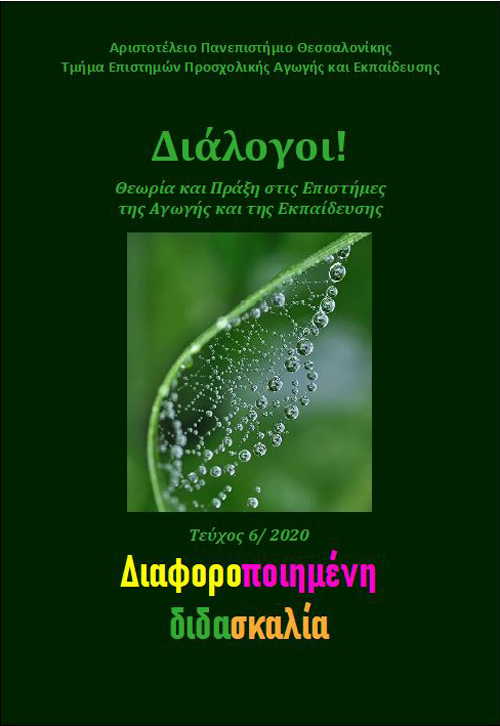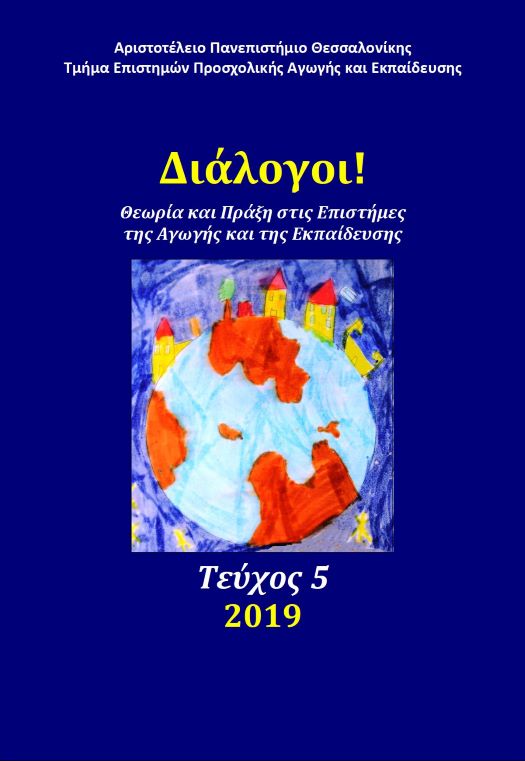Η διαφοροποιημένη παιδαγωγική στην προσχολική εκπαίδευση: Προκλήσεις και προοπτικές

Περίληψη
Παρόλο που η πολυμορφία είναι ο κανόνας μέσα στις προσχολικές τάξεις και το ενδιαφέρον για την εφαρμογή διαφοροποιημένων παιδαγωγικών προσεγγίσεων συνεχώς ανανεώνεται, οι προσεγγίσεις αυτές ακόμα δεν έχουν βρει τη θέση τους στο πλαίσιο της προσχολικής εκπαίδευσης.
Μετά από μια σύντομη επισκόπηση της θεωρητικής θεμελίωσης και του πλαισίου εφαρμογής της διαφοροποιημένης παιδαγωγικής (ΔΠ) και λαμβάνοντας υπόψη την ιδιαιτερότητα της εκπαίδευσης των μικρών παιδιών, η μελέτη αυτή εστιάζει στην επανεξέταση βασικών συνιστωσών της ΔΠ. Για να υποστηρίξει τη σημασία αυτής της εστίασης που αφορά τις έννοιες της διαφορετικότητας, της αξιολόγησης και των ενδιαφερόντων των παιδιών, βασίζεται σε κοινωνικοπολιτισμικές προσεγγίσεις (δηλ. αποθέματα γνώσης) και ιδέες (δηλ. ΖΕΑ), που διασταυρώνονται με βασικές αρχές της ΔΠ.
Το άρθρο καταλήγει στο συμπέρασμα ότι η βάση τεκμηρίωσης για διαφοροποίηση στην προσχολική εκπαίδευση, χρειάζεται, αφού αμφισβητήσει το αυστηρό πλαίσιο εφαρμογής της ΔΠ, να ενσωματώσει μια ευρύτερη άποψη για την διαφορετικότητα των παιδιών, να αναγνωρίσει τον πλούτο των πολιτισμικά αναπτυγμένων γνώσεων και δεξιοτήτων που τα παιδιά φέρνουν στο σχολείο και να διαμορφώσει ένα δυναμικό, συνεκτικό και ολοκληρωμένο πλαίσιο για την αξιολόγηση, ενσωματώνοντας εργαλεία που επιτρέπουν στους μικρούς μαθητές να αφηγούνται τις προσωπικές τους ιστορίες μάθησης και να ανακαλύπτουν τα ενδιαφέροντά τους.
Λεπτομέρειες άρθρου
- Πώς να δημιουργήσετε Αναφορές
-
Παπανδρέου Μ. (2020). Η διαφοροποιημένη παιδαγωγική στην προσχολική εκπαίδευση: Προκλήσεις και προοπτικές. Διάλογοι! Θεωρία και πράξη στις επιστήμες αγωγής και εκπαίδευσης, 6, 77–96. https://doi.org/10.12681/dial.25547
- Τεύχος
- Τόμ. 6 (2020)
- Ενότητα
- Ειδικό Θέμα

Αυτή η εργασία είναι αδειοδοτημένη υπό το CC Αναφορά Δημιουργού – Μη Εμπορική Χρήση – Παρόμοια Διανομή 4.0.
Οι συγγραφείς των άρθρων που δημοσιεύονται στο Διάλογοι! Θεωρία και Πράξη στις Επιστήμες Αγωγής και Εκπαίδευσης διατηρούν τα δικαιώματα πνευματικής ιδιοκτησίας επί των άρθρων τους, δίνοντας στο περιοδικό το δικαίωμα της πρώτης δημοσίευσης. Άρθρα που δημοσιεύονται στο Διάλογοι! Θεωρία και Πράξη στις Επιστήμες της Αγωγής και Εκπαίδευσης διατίθενται με άδεια Creative Commons 4.0 και σύμφωνα με την άδεια μπορούν να χρησιμοποιούνται ελεύθερα, με αναφορά στον/στη συγγραφέα και στην πρώτη δημοσίευση για μη κερδοσκοπικούς σκοπούς και με δικαίωμα τροποποίησης μόνον με παρόμοια διανομή (αν αναμείξετε, τροποποιήσετε, ή δημιουργήσετε πάνω στο υλικό, πρέπει να διανείμετε τις δικές σας συνεισφορές υπό την ίδια άδεια όπως και το πρωτότυπο).
To Τμήμα Επιστημών Προσχολικής Αγωγής και Εκπαίδευσης του Αριστοτέλειου Πανεπιστημίου Θεσσαλονίκης και το Εθνικό Κέντρο Τεκμηρίωσης διατηρούν το δικαίωμα να δημοσιεύουν, να αναπαραγάγουν, να παρουσιάζουν στο κοινό, να διανέμουν και να χρησιμοποιούν άρθρα που δημοσιεύονται στο Διάλογοι! Θεωρία και Πράξη στις Επιστήμες Αγωγής και Εκπαίδευσης σε οποιοδήποτε μέσο και μορφή είτε μεμονωμένα είτε ως μέρη συλλογικών έργων, για όλο το χρόνο διάρκειας προστασίας της πνευματικής ιδιοκτησίας και για όλες τις χώρες του κόσμου.
Αυτό περιλαμβάνει ενδεικτικά, και όχι αποκλειστικά, το δικαίωμα δημοσίευσης των άρθρων σε τεύχη του περιοδικού Διάλογοι! Θεωρία και Πράξη στις Επιστήμες Αγωγής και Εκπαίδευσης, αναπαραγωγής και διανομής μεμονωμένων αντιγράφων των άρθρων, αναπαραγωγής ολόκληρων των άρθρων σε άλλη έκδοση του Τμήματος Επιστημών Προσχολικής Αγωγής και Εκπαίδευσης του Αριστοτέλειου Πανεπιστημίου Θεσσαλονίκης και του Εθνικού Κέντρου Τεκμηρίωσης και αναπαραγωγής και διανομής των άρθρων ή περίληψης αυτών με χρήση πληροφορικού συστήματος αποθετηρίου.



